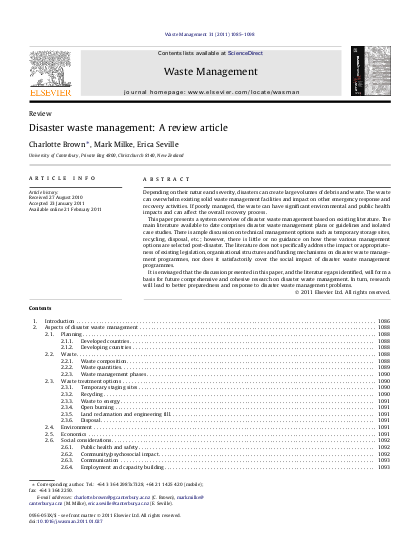
Depending on their nature and severity, disasters can create large volumes of debris and waste. The waste can overwhelm existing solid waste management facilities and impact on other emergency response and recovery activities. If poorly managed, the waste can have significant environmental and public health impacts and can affect the overall recovery process.
This paper presents a system overview of disaster waste management based on existing literature. The main literature available to date comprises disaster waste management plans or guidelines and isolated case studies. There is ample discussion on technical management options such as temporary storage sites, recycling, disposal, etc.; however, there is little or no guidance on how these various management options are selected post-disaster. The literature does not specifically address the impact or appropriateness of existing legislation, organisational structures and funding mechanisms on disaster waste management programmes, nor does it satisfactorily cover the social impact of disaster waste management programmes.
It is envisaged that the discussion presented in this paper, and the literature gaps identified, will form a basis for future comprehensive and cohesive research on disaster waste management. In turn, research will lead to better preparedness and response to disaster waste management problems.
Resource collections
- UN Habitat - Urban Response Collection
- Urban Response - Urban Crisis Preparedness and Risk Reduction
- Urban Response Collection - Community Engagement and Social Cohesion
- Urban Response Collection - Economic Recovery
- Urban Response Collection - Environment and Climate Change
- Urban Response Collection - Housing, Land and Property
- Urban Response Collection - Urban Crisis Response, Recovery and Reconstruction
- Urban Response Collection - Urban Resilience